Top Rankings
Englewood Cliffs School District ranks among the top 20% of public school district in New Jersey for:
Category
Attribute
Overall Rank
Highest overall rank (Top 1%)
Math Proficiency
Highest math proficiency (Top 5%)
Reading/Language Arts Proficiency
Highest reading/language arts proficiency (Top 1%)
Science Proficiency
Highest science proficiency (Top 5%)
Student Attention
Lowest student:teacher ratio (Top 1%)
For the 2025 school year, there is 1 public middle school serving 266 students in Englewood Cliffs School District. This district's average middle testing ranking is 10/10, which is in the top 1% of public middle schools in New Jersey.
Public Middle School in Englewood Cliffs School District have an average math proficiency score of 82% (versus the New Jersey public middle school average of 32%), and reading proficiency score of 93% (versus the 48% statewide average).
Minority enrollment is 76% of the student body (majority Asian), which is more than the New Jersey public middle school average of 68% (majority Hispanic).
Overview
This School District
This State (NJ)
# Schools
2 Schools
835 Schools
# Students
422 Students
458,046 Students
# Teachers
49 Teachers
39,885 Teachers
Student : Teacher Ratio
9:1
9:1
District Rank
Englewood Cliffs School District, which is ranked within the top 1% of all 646 school districts in New Jersey (based off of combined math and reading proficiency testing data) for the 2021-2022 school year.
Overall District Rank
#5 out of 650 school districts
(Top 1%)
(Top 1%)
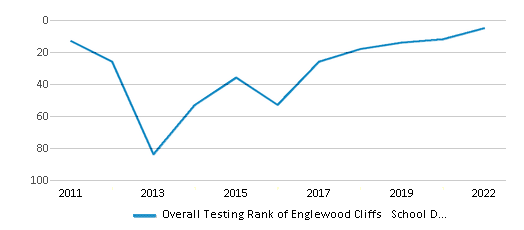
Math Test Scores (% Proficient)
82%
36%
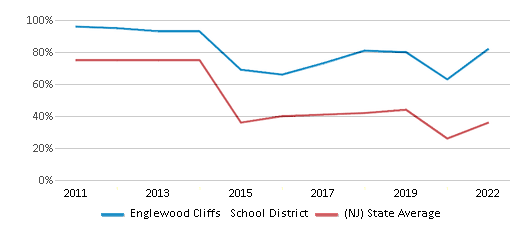
Reading/Language Arts Test Scores (% Proficient)
93%
49%
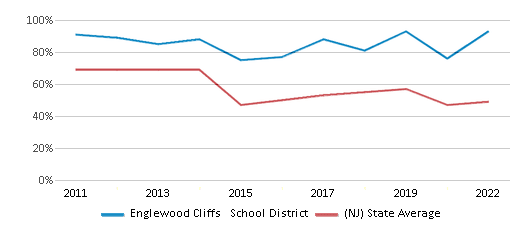
Science Test Scores (% Proficient)
65-69%
23%
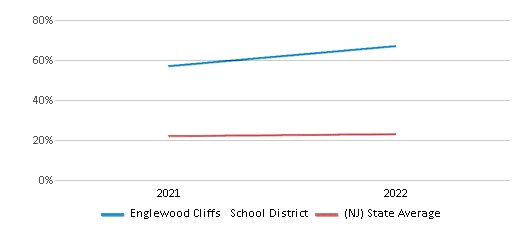
Students by Ethnicity:
Diversity Score
0.56
0.72
# American Indian Students
n/a
913 Students
% American Indian Students
n/a
n/a
# Asian Students
258 Students
39,872 Students
% Asian Students
61%
9%
# Hispanic Students
32 Students
173,877 Students
% Hispanic Students
8%
38%
# Black Students
11 Students
84,536 Students
% Black Students
3%
18%
# White Students
103 Students
145,711 Students
% White Students
24%
32%
# Hawaiian Students
3 Students
858 Students
% Hawaiian Students
1%
n/a
# Two or more races Students
15 Students
12,134 Students
% of Two or more races Students
3%
3%
Students by Grade:
# Students in PK Grade:
32
12,448
# Students in K Grade:
46
19,022
# Students in 1st Grade:
33
19,268
# Students in 2nd Grade:
45
19,849
# Students in 3rd Grade:
37
20,625
# Students in 4th Grade:
64
22,766
# Students in 5th Grade:
33
30,973
# Students in 6th Grade:
49
79,058
# Students in 7th Grade:
40
100,830
# Students in 8th Grade:
43
101,895
# Students in 9th Grade:
-
8,812
# Students in 10th Grade:
-
7,480
# Students in 11th Grade:
-
7,369
# Students in 12th Grade:
-
7,529
# Ungraded Students:
-
122
District Revenue and Spending
The revenue/student of $41,991 is higher than the state median of $26,931. The school district revenue/student has stayed relatively flat over four school years.
The school district's spending/student of $37,967 is higher than the state median of $25,828. The school district spending/student has stayed relatively flat over four school years.
Total Revenue
$18 MM
$36,642 MM
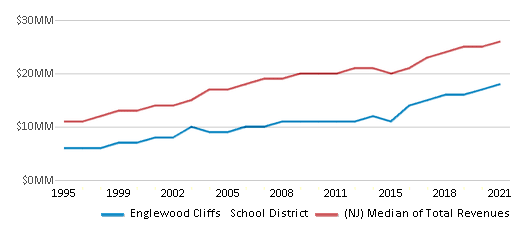
Spending
$16 MM
$35,142 MM
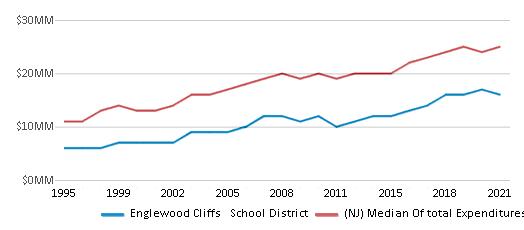
Revenue / Student
$41,991
$26,931
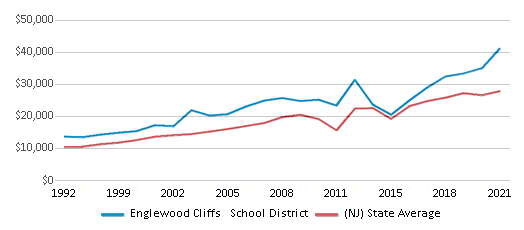
Spending / Student
$37,967
$25,828
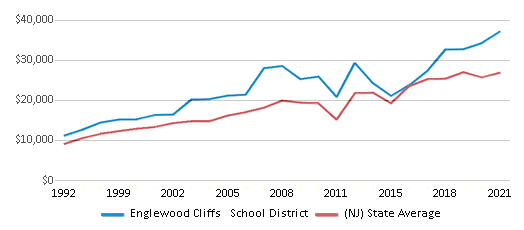
Best Englewood Cliffs School District Public Middle Schools (2025)
School
(Math and Reading Proficiency)
(Math and Reading Proficiency)
Location
Grades
Students
Rank: #11.
Upper School
(Math: 82% | Reading: 93%)
Rank:
Rank:
10/
Top 1%10
143 Charlotte Pl
Englewood Cliffs, NJ 07632
(201) 567-7292
Englewood Cliffs, NJ 07632
(201) 567-7292
Grades: 3-8
| 266 students
Recent Articles

Year-Round Or Traditional Schedule?
Which is more appropriate for your child? A year-round attendance schedule or traditional schedule? We look at the pros and cons.

Why You Should Encourage Your Child to Join a Sports Team
Participating in team sports has a great many benefits for children, there is no doubt. In this article you will learn what those benefits are.

White Students are Now the Minority in U.S. Public Schools
Increasing birth rates among immigrant families from Asia and Central and South America, combined with lower birth rates among white families, means that for the first time in history, public school students in the United States are majority-minority. This shift in demographics poses difficulties for schools as they work to accommodate children of varying language abilities and socio-economic backgrounds.





